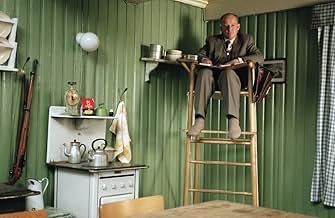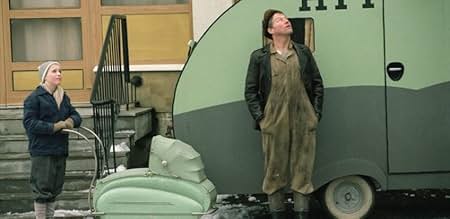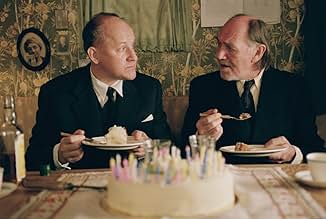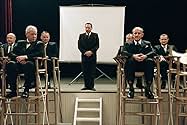IMDb-BEWERTUNG
7,3/10
8795
IHRE BEWERTUNG
Füge eine Handlung in deiner Sprache hinzuA scientific observer's job of observing an old cantankerous single man's kitchen habits is complicated by his growing friendship with him.A scientific observer's job of observing an old cantankerous single man's kitchen habits is complicated by his growing friendship with him.A scientific observer's job of observing an old cantankerous single man's kitchen habits is complicated by his growing friendship with him.
- Regie
- Drehbuch
- Hauptbesetzung
- Auszeichnungen
- 8 Gewinne & 7 Nominierungen insgesamt
Gard B. Eidsvold
- Bakkerman
- (as Gard Eidsvold)
Empfohlene Bewertungen
As a result of a study in the 1950s in which efficiency experts at the Home Research Institute observed the kitchen habits of Swedish housewives to come up with a better workspace design, eighteen men are transported in caravans to farms in Norway to observe the cooking habits of Norwegian single men. Kitchen Stories, a quirky comedy co-written by Swedish director Bent Hamer and Norway's Jörgen Bergmark, depicts the relationship between two elderly single men, a relationship in which the observer ends up being the observed. The film is similar, in its deadpan humor and offbeat characters, to the work of Aki Kaurismäki, but without the Finnish director's overbearing self-consciousness.
The scientists wear white lab coats and carry clipboards, seemingly poised for an ET-like invasion. The observers, however, must live outside the homes of their subjects in small trailers and are not allowed to talk, drink, or otherwise interact with their subjects. Some, however, are not willing subjects. One of the scientists, Folke, a Swede (Tomas Norström), draws Isak (Joachim Calmeyer), an antisocial Norwegian farmer used to living in solitude. Isak at first refuses to let Folke into his house, resentful that the horse he was promised in return for his participation turned out to be a figurine. Folke, however, eventually gains access to the kitchen and sits every day perched in his high observation chair, recording Isak's every movement like the Lord High Executioner until Isak decides to take his hot plate up to his bedroom to frustrate his unwelcome guest.
The sly Isak drills a hole through the upstairs bedroom floor and now secretly watches Folke in the kitchen. When they start conversing, each man insists on speaking his own language (not shown by the subtitles) as if to doggedly maintain their separate identities. Gradually they become friends, breaking through the barriers in their life that have imposed a limiting solitude. They begin first by drinking coffee in the morning, sharing a bit of their background, and then celebrating Isak's birthday with cake and bourbon whiskey. Their interaction, of course, is against the rules of the study, and there are consequences for Folke. His life, however, acquires new meaning the more willing he is to take risks and share himself openly. Kitchen Stories is a small film, but one that is warmhearted and thoroughly enjoyable, a work that celebrates the small pleasures in just being alive without trying to be profound or seduce us with blatant emotional appeals.
The scientists wear white lab coats and carry clipboards, seemingly poised for an ET-like invasion. The observers, however, must live outside the homes of their subjects in small trailers and are not allowed to talk, drink, or otherwise interact with their subjects. Some, however, are not willing subjects. One of the scientists, Folke, a Swede (Tomas Norström), draws Isak (Joachim Calmeyer), an antisocial Norwegian farmer used to living in solitude. Isak at first refuses to let Folke into his house, resentful that the horse he was promised in return for his participation turned out to be a figurine. Folke, however, eventually gains access to the kitchen and sits every day perched in his high observation chair, recording Isak's every movement like the Lord High Executioner until Isak decides to take his hot plate up to his bedroom to frustrate his unwelcome guest.
The sly Isak drills a hole through the upstairs bedroom floor and now secretly watches Folke in the kitchen. When they start conversing, each man insists on speaking his own language (not shown by the subtitles) as if to doggedly maintain their separate identities. Gradually they become friends, breaking through the barriers in their life that have imposed a limiting solitude. They begin first by drinking coffee in the morning, sharing a bit of their background, and then celebrating Isak's birthday with cake and bourbon whiskey. Their interaction, of course, is against the rules of the study, and there are consequences for Folke. His life, however, acquires new meaning the more willing he is to take risks and share himself openly. Kitchen Stories is a small film, but one that is warmhearted and thoroughly enjoyable, a work that celebrates the small pleasures in just being alive without trying to be profound or seduce us with blatant emotional appeals.
Imagine your job entails watching the habits of the people in their kitchens, their comings and goings: from the oven to the fridge, from the washing machine to the cupboard... How come? Well, let's say you're an employee of an enterprise that's looking forward to optimize the arrangement of people's houses to make their life more comfortable (???). You just sit there and watch your assigned "specimen". No talking, no communication between you and him. Now imagine you're the "specimen", and that there's a man sit on your kitchen observing your behavior!!!
Yeah, it's such a crazy plot, but it comes in handy for the director to express his message: man is a social creature and everybody needs someone sometime.
A small movie about small people, calm and intimate. It will make you snore by the second sequence if you're looking for some action... Otherwise, if you don't mind about contemplative cinema, this movie's gonna leave you a nice taste in your mouth.
*My rate: 7/10
Yeah, it's such a crazy plot, but it comes in handy for the director to express his message: man is a social creature and everybody needs someone sometime.
A small movie about small people, calm and intimate. It will make you snore by the second sequence if you're looking for some action... Otherwise, if you don't mind about contemplative cinema, this movie's gonna leave you a nice taste in your mouth.
*My rate: 7/10
This film was a surprise since we went without any preconceptions, having avoided reading about it beforehand. It is a droll attempt at film making by Bent Hamer, the director, who collaborated on the scenario.
The film presents a story that on its surface seems to be one thing, but deep inside there is an ode to friendship between two different, but stoic Scandinavian men, Isak and Folke, whose lives become entwined as they discover how they are similar, despite of all appearances. The story is set in the bleak and snowy Norwegian winter.
In the end, Folke is a better man by having known Isak, the man who he doesn't understand at the beginning of the story, but who unknown to him, was always looking over him, without the other one knowing it.
The three principals are very well portrayed. This film will resonate with people that find themselves alone at the last stages of their lives, and how they are changed by opening up to perfect strangers who are going through the same thing themselves.
The film presents a story that on its surface seems to be one thing, but deep inside there is an ode to friendship between two different, but stoic Scandinavian men, Isak and Folke, whose lives become entwined as they discover how they are similar, despite of all appearances. The story is set in the bleak and snowy Norwegian winter.
In the end, Folke is a better man by having known Isak, the man who he doesn't understand at the beginning of the story, but who unknown to him, was always looking over him, without the other one knowing it.
The three principals are very well portrayed. This film will resonate with people that find themselves alone at the last stages of their lives, and how they are changed by opening up to perfect strangers who are going through the same thing themselves.
The summary of Salmer fra kjokkenet in imdb places the movie in the "feel good" genre. This may be true for UK citizens, however a swede really gets the shivers alongside with incontrollable laughs while watching this movie.
The horror derives from the fact that since the thirties the Swedish politicians seriously have believed that they were able to shape society with reason and logic. Thus in the movie, there is the "Institute of private homes research", the object being to develop the most logically structured kitchen, adapted to the average movements of the "normal" house wife.
This excellent movie made in Norway, the neighbouring country of Sweden - which up to 1905 was submitted in a state union with Sweden - makes a very convincing statement about the "swedish mentality", that is how our welfare state has developed during the past 70 years.
The growing relationship between the aging Norwegian farmer and the archetypical swedish bureaucrat Nilsson. Nilssons job is to observe his delinquent while he is performing the daily chores in the country kitchen, is moving and, I think, quite significant if you're interested in the nature of mankind - one of Nilssons colleagues comes at him with the a priceless line of speach: "How the f**k can one know anything about ones fellow man, if not speaking to him?" It needs to be said - the obeservators are strongly advised not to interfere with their "objects of research".
In other words; at one level of Salmer fra kjokkenet provides you with great laughs, if you recognize the type who's main interest is to grasp control of your behavior, of your life. At another level this is a painful, yes, raw settlement with the swedish "social engineering" so admired by foreigners, at least in the past.
I cannot think of any other movie more worth recommending to somebody who's interested in what mankind really is, and what caricature she can made into.
This is a movie about how to make friends when every other possibility is exhausted, how to talk man to man, when every way of communication i banned by the "authorities".
The horror derives from the fact that since the thirties the Swedish politicians seriously have believed that they were able to shape society with reason and logic. Thus in the movie, there is the "Institute of private homes research", the object being to develop the most logically structured kitchen, adapted to the average movements of the "normal" house wife.
This excellent movie made in Norway, the neighbouring country of Sweden - which up to 1905 was submitted in a state union with Sweden - makes a very convincing statement about the "swedish mentality", that is how our welfare state has developed during the past 70 years.
The growing relationship between the aging Norwegian farmer and the archetypical swedish bureaucrat Nilsson. Nilssons job is to observe his delinquent while he is performing the daily chores in the country kitchen, is moving and, I think, quite significant if you're interested in the nature of mankind - one of Nilssons colleagues comes at him with the a priceless line of speach: "How the f**k can one know anything about ones fellow man, if not speaking to him?" It needs to be said - the obeservators are strongly advised not to interfere with their "objects of research".
In other words; at one level of Salmer fra kjokkenet provides you with great laughs, if you recognize the type who's main interest is to grasp control of your behavior, of your life. At another level this is a painful, yes, raw settlement with the swedish "social engineering" so admired by foreigners, at least in the past.
I cannot think of any other movie more worth recommending to somebody who's interested in what mankind really is, and what caricature she can made into.
This is a movie about how to make friends when every other possibility is exhausted, how to talk man to man, when every way of communication i banned by the "authorities".
This movie pokes fun, in a very gentle way, at a whole lot of things. At the Swedes and their "Ikea-type" market research, at the Norwegians and their laconic ways, and at the strange ways of humans altogether. This movie manages to be moving without being sentimental or manipulative. What I mean here is that the element of manipulation that is quite obvious in many of the more sophisticated recent "feel good" movies I generally enjoy (you know the ones I mean - Cinema Paradiso, Billy Elliot etc.) is not in evidence here. We are getting at something pretty basic and human with "Kitchen Stories". The movie tracks the unlikely relationship that develops between the Swedish market researcher, sent to observe (and strictly forbidden to interact with the subject of his study) the kitchen ways of his crusty Norwegian bachelor "host". Sounds rather minimal but this is a movie that is as good as a movie can get. Perfect pacing, perfect acting, perfect camera work, perfect story. While the movie can be enjoyed on the tv, as video, I think that it is best seen on a larger screen in a movie theater because the visual impact is strong. You come out of this movie a happier person than went in and that is worth something these days !
Wusstest du schon
- WissenswertesAt the beginning of the film, Malmberg (a Swede) becomes ill after having to drive on the right side of the road in Norway. Today both countries drive on the right. In 1967, Sweden switched to the right because making two versions of cars like Volvos and Saabs for domestic and foreign sales was inefficient. Also, there are many unguarded, unmarked border crossings points (unlike the crossing in the film); people would not realize which country they were in and sometimes ended up driving on the wrong side.
- VerbindungenSpoofed in Brødrene Dal og mysteriet med Karl XIIs gamasjer: Folge #1.1 (2005)
- SoundtracksVisa Från Utanmyra
Performed by Jan Johansson
Top-Auswahl
Melde dich zum Bewerten an und greife auf die Watchlist für personalisierte Empfehlungen zu.
- How long is Kitchen Stories?Powered by Alexa
Details
Box Office
- Bruttoertrag in den USA und Kanada
- 351.235 $
- Eröffnungswochenende in den USA und in Kanada
- 48.103 $
- 22. Feb. 2004
- Weltweiter Bruttoertrag
- 2.823.472 $
- Laufzeit
- 1 Std. 35 Min.(95 min)
- Farbe
- Sound-Mix
- Seitenverhältnis
- 1.85 : 1
Zu dieser Seite beitragen
Bearbeitung vorschlagen oder fehlenden Inhalt hinzufügen




























